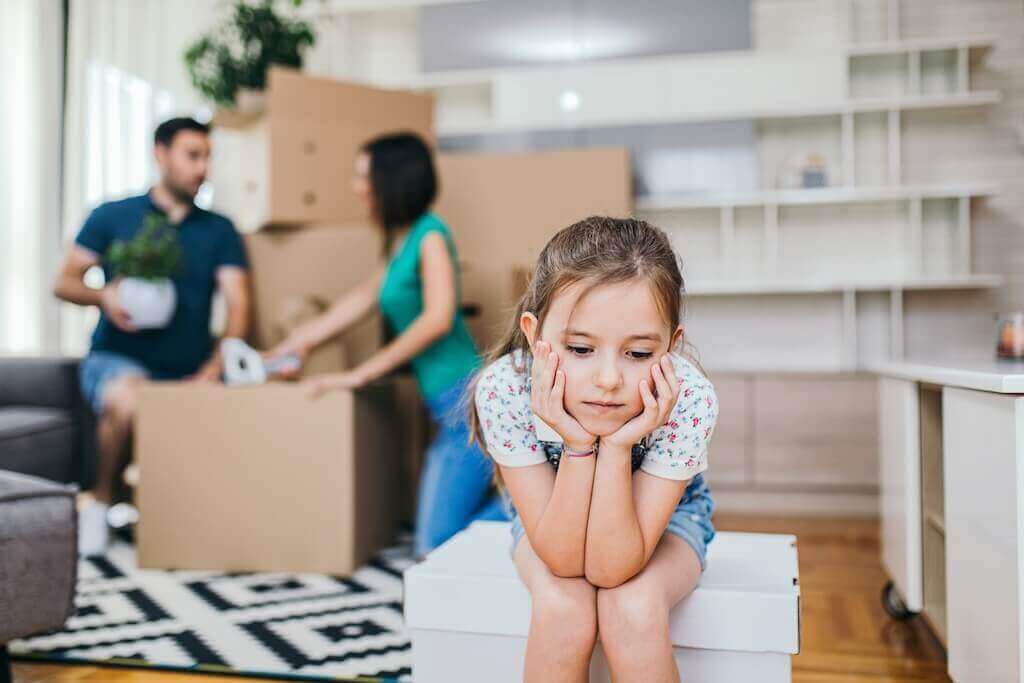Is it really possible to be depressed after moving into a new house? Yes – most definitely, this happens a lot, so if you are struggling with depression after moving, know that you’re not the only one. This is a legitimate medical condition that can affect your quality of life if not treated. Why do people experience this after changing their home and relocating to another city? We have all the answers in the text below.


Leaving a place you’ve been calling home for years is quite emotional. You’ve gotten used to everything in that city – coffee shops, stores, streets in your neighborhood. Now you have to start all over again, and what’s worse, you have to do it without your friends and family. No wonder people get depressed after long-distance moving, right? But, luckily, this is something you can fight, and with healthy coping mechanisms, you will soon adapt to new surroundings.
After relocating across the country, plenty of people suffer emotionally – they don’t know how to adjust to another town. It may sound silly to some, but this is pretty common, especially for those who have moved away from family and friends and are all alone in a strange new place.
Even if they had the most efficient move in the history of relocations, perfect relocation services, and plenty of valid reasons to move, their mental health could be compromised. This is a severe condition that has to be addressed in some way – if you recognize yourself in these words, keep reading to find out how to help yourself overcome this difficulty and learn to enjoy the benefits of the move.
How does moving house affect you emotionally? Why does this happen to some but not others? The truth is that, even if you had a stress-free move and have avoided all of the relocation mistakes, you can still regret your decision to move to a new home and struggle with a change – this is called transitional trauma.
Some get used to living in a new apartment quickly, even if they have moved to a big city, but others need more time. Eventually, everybody will be okay, but those who require longer will struggle in the meanwhile – being depressed, anxious, or unproductive and isolated from the world are the most common manifestations.
Will you feel like this forever? No, but it will last for some amount of time. So, how long does relocation depression last? It can last anywhere from a few days to more than a year. Usually, it won’t be longer than a year and a half, but every case is unique. Obviously, if it lasts this long, you will notice you feel bad and ask for help. But, don’t let it come to that – our relocation tip would be to learn to recognize the signs and symptoms as soon as they appear. The sooner you start battling this issue, the easier it will be to win.

How do you tell apart normal relocation stress resulting from too many tasks on your to-do list from having pathological feelings – that is, being depressed? Relocation depression will make you feel more than typical nostalgia and sadness. Be sure to look out for the following signs and symptoms that suggest you are depressed:

If you also had anxiety about relocating, you probably understand that there are more than a few things you can try to get rid of mental health issues. Naturally, these tricks won’t work on everyone, but they will help most of us. It’s best to try whatever you can to improve your well-being, and then, if nothing works, you should call a mental health professional.
Like with most problems in life, taking care of your health (both mental and physical) can improve your condition. Sure, it won’t help you get a job in another state before the move or organize an office move, but it will get you in a better state of mind, which will allow you to face difficulties and handle them better. Regular physical exercise can boost your mood, strength and bring your energy to a higher level.
Be sure to add at least an hour of your preferred activity each day – jogging, yoga, dancing, or anything else you love. Additionally, try to take care of your eating regimen – eat healthy food and avoid alcohol (it’s a depressant, so it will only get you feeling worse, even if it temporarily numbs the sadness).
Friends and family matter more than ever – that’s a rule that can apply to anyone depressed, no matter the reason. If you want to get your health back to normal, having a strong support system is of utmost importance. It will speed up your recovery and adjustment and get your mind off of dark thoughts that can be hard to fight when you are alone.
Of course, after cross-country moving, your old buddies and family members aren’t so close and can’t come by your apartment every day – but we have the technology to overcome that barrier. You will never be more grateful for video calls (or regular ones) than now.

We all know how to cheer ourselves up when we have a terrible day at work or a fight with our loved ones. If you think that these simple mood-boosting techniques won’t work on a severe condition as this one, think again. It’s entirely possible that even the simplest of things, such as binging Friends for the 100th time or re-reading one of Harry Potter books, will make you feel better (well, maybe not the fifth part – Bellatrix Lestrange’s murderous skills might depress you even more). All that’s important is to find an activity that you love, and that relaxes you. Give it a try – you have nothing to lose. You will realize that this works even better than expected.
Once you rest after the exhausting relocation day and unpack after the move, the reality will set in, and you’ll realize that you don’t have any company in this city. If you’ve moved for love, you will have your partner to lean on, but your world can’t revolve around one person – you still need someone to hang out with.
So, how to make a friend in another state? Start with getting to know your colleagues and neighbors. You will bond at least with one person, and then they can introduce you to someone else, so you will start expanding your social circle in this city. Of course, this won’t happen overnight – you will have to be patient.

Use this opportunity to broaden your views and learn something. Keeping busy will be helpful in battling nostalgia and sadness. Join a local book club, or start pottery lessons, for example – anything that seems interesting, but you hadn’t had the opportunity to do it before because you were too busy with your job or social life. Joining any local group will allow you to get familiar with the community, and you might even meet a friend.
If being surrounded by the crowd is too much for you right now, that’s okay. You can still find some alone activities that are good for improving your state of mind after a long-distance move. Explore your city – pretend you are a tourist, and go sightseeing. There must be plenty of beautiful landmarks that you will love – get familiar with the history and culture of your city. You’ll be feeling like less of an outsider after that, trust us. Also, try to find a restaurant that’s perfect for you or a coffee shop that’s on your way to work – little things like this will speed up the adjustment process.

Just like one move can cause you trouble, frequent relocations can also trigger psychological issues. This happens to both adults and children but is especially noticeable in kids, so that’s something to think about if you are relocating with children. Of course, the effect of frequent changes differs in children of different ages.
For example, relocating with a newborn won’t have as much impact on a kid’s well-being as relocating with a ten-year-old. With babies, your biggest problem will be baby-proofing a house. Either way, if you provide your kids with proper emotional support and a therapist (if needed), there’s no reason for any future struggles.

If your symptoms persist even after you’ve tried everything possible to improve your condition, that means that contacting a professional should be your next step. You shouldn’t be feeling embarrassed about it – it happens to countless others every year. Fear and difficulties adjusting to changes are severe and, luckily, something that healthcare professionals can help you with.
Don’t hesitate even for a minute – pick up the phone and call a therapist. And remember – you’re not alone in this. It might seem so, but you are one of the millions who are struggling. Sometimes, it helps to be reminded of that – check out the video below to hear what other people with similar issues had to say about that. Their advice for overcoming difficulties can be of use to you.
Don’t be too hard on yourself – we all struggle at some point in our lives. Think of it like this – you’ve gotten through all those things to do before the move – you have found reputable long-distance movers and packers that provide proper packing services, and you’ve managed to get a reliable auto transport service.
While under plenty of stress and anxiety, organizing a move is a nightmare, but you’ve done it, and you should enjoy the fruits of your labor. As soon as you deal with your current difficulties, you will realize that relocating to another state is a great adventure, and you will start enjoying the change.